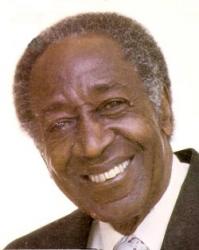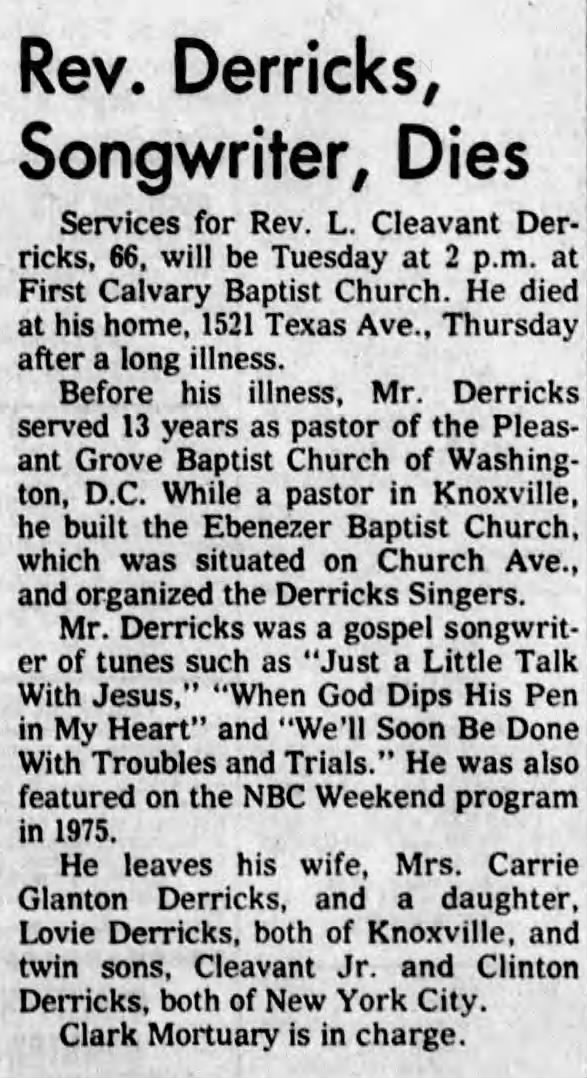Hymn History: Just a Little Talk with Jesus
Author: Cleavant Derricks
“The same songs that ministered to impoverished blacks enduring discrimination in the Jim Crow South, spoke to the hearts of disadvantaged whites whose lot seemed similarly dismal…”
(Greg Freeman)
The Origin of the Hymn “Just a Little Talk with Jesus”
Few gospel songs capture the heartfelt simplicity of prayer as warmly as “Just a Little Talk with Jesus.” With its lively rhythm and earnest testimony, it has been beloved across churches—particularly in the American South—for generations. Both a congregational favorite and a staple of gospel quartets, this hymn has comforted believers with its assurance that even a “little talk” with Christ can make life’s burdens lighter. Its origin is tied to the faith and creativity of Cleavant Derricks, a pastor, musician, and teacher whose life spanned both ministry and music.
Cleavant Derricks: The Hymnwriter
The hymn “Just a Little Talk with Jesus” was written by Cleavant Derricks (1910–1977), an African American Baptist minister, choir director, and gospel composer. Born in Chattanooga, Tennessee, Derricks grew up in a musical and faith-filled environment. He trained at Cadek Conservatory of Music in his hometown, later studied at Tennessee Agricultural and Industrial College, and attended the American Baptist Theological Seminary in Nashville.
Derricks combined his pastoral calling with a passion for music. He served as pastor in several churches, but also wrote and arranged gospel songs that reflected the style and spirit of the African American church tradition—songs that were both deeply spiritual and musically engaging. He eventually authored or arranged dozens of works, but none became as widely sung as “Just a Little Talk with Jesus.”
Inspiration and Composition
Written during the early 1930s, the hymn reflects the oral, improvisational style of African American congregational song. It is not lofty or formal in language; instead, it speaks plainly, much like the way a believer might share testimony in church. The opening lines—“I once was lost in sin, but Jesus took me in”—echo the personal conversion experience so central to Baptist and Holiness traditions.
Derricks’s refrain, with its repeated assurances that “just a little talk with Jesus makes it right,” captures both the theology of prayer and the lived experience of worship. The song emphasizes that prayer need not be complicated: believers can approach Christ directly, speak honestly about their needs, and receive comfort and assurance in return.
Publication and Popularization
The hymn was first published in 1937 by the Stamps-Baxter Music Company, a leading publisher of gospel music at the time. Stamps-Baxter specialized in shape-note songbooks used in “singing schools” and church conventions throughout the South. These books helped spread gospel songs quickly across congregations, creating a shared repertoire of lively, accessible hymns.
Through Stamps-Baxter’s publication, “Just a Little Talk with Jesus” soon became a favorite in Southern Baptist and evangelical circles. Its engaging call-and-response structure and rhythmic energy made it especially appealing to gospel quartets, which were growing in popularity in the mid-twentieth century. Groups like the Blackwood Brothers, the Statesmen Quartet, and later the Oak Ridge Boys recorded memorable renditions, cementing the song’s place in the gospel quartet tradition.
A Song of Accessibility and Assurance
One of the reasons for the hymn’s enduring success is its accessibility. The words are direct, the tune is memorable, and the message is universal. Unlike hymns filled with complex theological phrasing, Derricks’s song speaks in everyday language about an experience common to all believers: the need to pray and the comfort of knowing that Christ listens.
The repetition in the refrain underscores the point—no matter the problem, “just a little talk with Jesus makes it right.” For congregations, the song provided both encouragement and a lively musical expression of faith. For quartets, it offered a chance to showcase harmony and energy, turning the hymn into a performance piece while retaining its devotional power.
Broader Legacy of Cleavant Derricks
While Derricks is best remembered for this hymn, his broader legacy in church life is noteworthy. He served as a pastor for many years, balancing preaching with composing and arranging. He also trained choirs, directed music at conventions, and left behind a body of work that enriched African American church music. Interestingly, his influence extended beyond the church world: his twin sons, Cleavant Derricks Jr. and Clinton Derricks-Carroll, became noted actors and singers, carrying forward the family’s artistic legacy.
Lasting Impact
Over eighty years since its first publication, “Just a Little Talk with Jesus” continues to be sung widely. It remains a fixture in hymnals and shape-note collections, and it is still performed by gospel quartets, bluegrass groups, and church choirs. Its message resonates because it is timeless: in every generation, believers discover that prayer brings peace, strength, and hope.
The hymn also bridges traditions. Though written within the African American Baptist context, it has been embraced across denominational and cultural lines. Its joyful spirit and reassuring words transcend boundaries, reminding the church universal that Christ is always near to those who call upon Him.
Conclusion
The story of “Just a Little Talk with Jesus” is one of simplicity with profound impact. Cleavant Derricks, out of his faith and musical gift, wrote a hymn that distilled the essence of Christian prayer into words and melody accessible to all. Published by Stamps-Baxter and carried to fame by gospel quartets, the song has traveled far beyond its Tennessee origins, touching countless lives with its reminder that prayer changes things.
In churches, conventions, recordings, and even casual singings, the hymn continues to lift hearts. Its origin reflects the vitality of African American gospel tradition, its spread reflects the communal spirit of shape-note singing, and its enduring appeal reflects the universal need for the assurance that, indeed, “just a little talk with Jesus makes it right.”
_____
Image Source/Credit (in order):
- Cleavant Derricks | Hymnary.org. hymnary.org/person/Derricks_Cleavant.
- Newspapers.com, The Knoxville News-Sentinel, April 16, 1977, https://www.newspapers.com/article/the-knoxville-news-sentinel/191534486/
Related
Sorry, no records were found. Please adjust your search criteria and try again.
Sorry, unable to load the Maps API.

